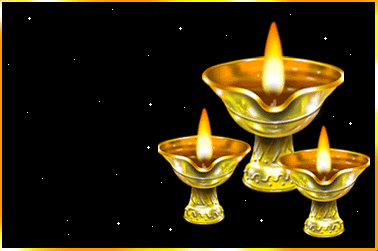5 Things You Need to Know About the Hindu Holiday Diwali
Diwali is one of the most important Hindu festivals celebrated in India and among the massive Indian diaspora worldwide. Known as the festival of lights, it takes place over five days and has varying customs depending on what part of India a person is from. It is also celebrated by Sikhs and Jains and in neighboring countries like Nepal.
Also known as Deepavali, literally meaning “row of lights” it celebrates the triumph of good over evil, a recurring theme in the Hindu epic Ramayana which tells the story of Lord Rama and his 14 years of exile and return to his kingdom. But the worship of Lakshmi, the goddess of wealth, is also a dominant Diwali tradition.
Diwali falls on the darkest night of the Hindu calendar “Kartika” which is usually between mid October and November and it coincides with the Hindu New Year.
Here are five things you should know about Diwali:
Cleanliness
Hindus clean every nook and cranny of their houses and yards several days before Diwali arrives. Not just the regular sweeping, vacuuming, and dusting but the wiping of ceilings, walls, re-washing bedroom linens, and cleaning kitchen cupboards top to bottom are common chores among many others. Hindus believe that goddess Lakshmi’s entry into their homes is an immense blessing so they do their part in welcoming her, by keeping a clean house. Some even draw red-colored footprints leading to their house as a representation of her arrival.
Decorations
Diyas, or small clay lamps, are lit all over the house. They’re also neatly lined outside of homes too. It is said that when Lord Rama returned from exile his people celebrated by lighting lamps all over the kingdom. Rangoli, which is a type of decorative design made at the entrance of homes, is very colorful and made out of colored rice powder. But nowadays, especially in the U.S., Hindus also decorate their houses with Christmas lights and motifs. Except the latter decorations go up in October or November (whenever Diwali falls that year) instead of December.
Beautiful Clothes and Delicious Sweets
Hindus dress up in their best or in their newest clothes on Diwali. Family, friends, relatives, and neighbors visit each other’s houses and exchange sweets and in some cases, dried fruit. Mouthwatering Indian sweets are not only made at home but are made in bulk, lasting for many days after the festival.
Puja
Diwali is a five-day festival that consists of different types of puja or religious prayer rituals each day. The first day is called Dhanteras and Hindus offer puja to Yamraj (Lord of death), they pray against untimely death. The second day, puja is offered to Lord Krishna who is an incarnation of Lord Vishnu (one of the three trinities of Hinduism), the third day is the actual Diwali day where puja is offered to goddess Lakshmi, the fourth day is Govardhan puja celebrating spiritual harvest, and the fifth and last day is Bhai Dooj, a day dedicated to sisters. Keep in mind that these pujas and rituals are not set in stone over the five days, different parts of India celebrate in different ways.
Fireworks
Fireworks are synonymous with Diwali celebrations. Loud and crackling, it is often a sound that is expected on Diwali night wherever there are large Hindu communities. From the smoky haze on the ground with children running in all directions to the visual spectacle in the sky enjoyed by parents entertaining guests in their living rooms, fireworks are easily the most enjoyable part of Diwali. It is also said that when Lord Rama came back from exile, his return was celebrated with light i.e. diyas and fireworks. Fireworks are also believed by some to ward off evil spirits.
Visit Hotel Beechwood Mussoorie for More Updates.


No comments:
Post a Comment